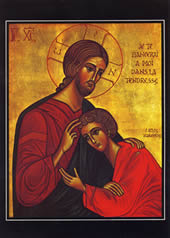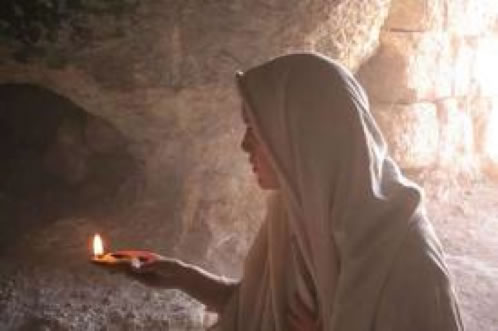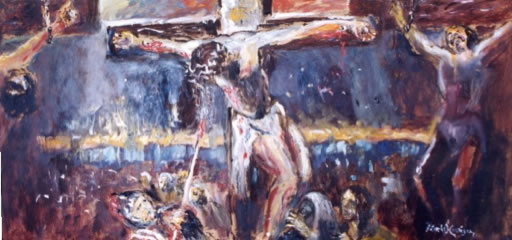John of the Cross
2. Matthew The Impact of God
Part 1: Entry

1. Impact (pages 1-4)
• We sense ‘a call to freedom, to wholeness, to more than what we are now. John of the Cross felt this as a call to reach out for God. But within us an unvoiced fear can make change impossible’.
• Is the call real? Will we experience communion with God? While we may not choose to follow a different call, ‘we may never fully choose this one’. John says the call is real. ‘He testifies to a God who is pressing in to meet me, to change me, to fill me where my need is deepest.’ God is love and love changes people.
• Faced with darkness we are tempted to give up.
• The Spirit of God is brooding over the chaos / darkness
and has the power to command: ‘Let there be light!’
• ‘Light shines in the darkness’.

• John teaches us that we are not alone in this journey.
It is Jesus’ longing that we share his journey.
We are called to share in Jesus’ communion with God.
Mary at the tomb


Homily of Pope Gregory the Great c.600AD
'Because of the ardent love of her heart, Mary continued seeking him when she could not find him, even after the other disciples had gone away. In tears she kept searching, and, afire with love, she yearned for him. Thus it happened that she alone saw him. She had already sought and found nothing, but she continued seeking and so found the object of her love. While she was seeking, her longing grew stronger and stronger, until it was allayed in the embrace of Him whom she was seeking … At first she did not recognise him, but then Jesus said to her: ‘Mary’ … as if to say: ‘Now recognise the one who recognises you’ … Outwardly it was He who was the object of her search, but inwardly it was He who was teaching her to search for Him'.
2. Echoing the Impact (pages 5-12)
John of the Cross 1542-1591
• 1563 left nursing to join the Carmelites
• 1577 (aged 35) in monastery cell-prison in Toledo (central Spain)
He knows what darkness is.
Spiritual Canticle 1577 completed 1582-1584
John Michael Talbot:
Where have you hidden Beloved?
Why have you wounded my soul?
I went out to the wilderness calling for you
but you were gone.
Oh shepherds keeping your watch in the hills,
if by chance you meet with my Love
tell Him I suffer in my lonely grief
and I soon will die.
But I have searched for my Love in the mountains,
I have searched among the meadows and the fields.
He has poured out a thousand graces in them
so my heart might be healed.
Yet my heart is not healed.
• 1577 (aged 35) in monastery cell-prison in Toledo (central Spain)
1578-1588 ministry in southern Spain
• 1591 back to south
‘In his darkness there was disclosed to him
Christ’s desire to love him’.
He discovered a God who ‘gives himself to the poor(Matthew)
3. Picking up the echo (pages 13-18)
• ‘His word came from experience. This experience gave him access to others at their point of need’(Matthew).
• ‘That is John’s greatest gift: not so much to tell us what to do, nor to pinpoint our place on the map. But to draw back the curtains and disclose the whole journey as real’(Matthew).
• ‘His word is not so much “perfection”, as if it were only about me becoming myself. He prefers to call it “union” – “union with God”, the “union of love”.’(Matthew)
To believe = to know from love-communion
• ‘We are excluded, not by where we are, but by an unwillingness to go farther. We are welcomed in when we wish to seek, to change, to be changed. We can hear John’s answer if we can share his question: “Beloved, where?’(Matthew).
• Jesus’ first words in John’s Gospel are addressed to two disciples: ‘What are you looking for?” When they asked ‘Where do you live?” he replied “Come and see”.
• The goal is not self-realisation but union and it is all-demanding and all-embracing.
Part II Gift
4. A quiet man speaks (pages 19-27)
'Living Flame': poem & prose commentary for Ana de Peñalosa
Written (1586?) at Granada when Vicar Provincial in a fortnight
during this period John travelled 8,600 miles.
John at his most relaxed, and so most intense

John of the Cross – Oh llama de amor viva : The Living Flame of Love
Stanza 1
O living flame of love
that tenderly wounds my soul
in its deepest centre.
Since you are not oppressive now,
finish your work if it be your will;
tear the veil of this sweet encounter.
Stanza 2
O sweet cautery!
O delightful wound!
O gentle hand! O delicate touch!
That tastes of eternal life,
And pays every debt
In killing you have changed death to life.
Stanza 3
O lamps of fire!
In whose splendours
The deep caverns of feeling,
Once obscure and blind,
Now, so strangely exquisite,
Give forth warmth and light to their Beloved.
Stanza 4
How gently and lovingly
You stir in my breast
Where in secret you dwell alone;
And in your sweet breathing
Filled with good and glory
How delicately you swell my heart with love!
John Michael Talbot:
O living flame of love, tenderly wound my soul
to its deepest inner heart, without oppression.
Come, consummate our love,
tear through the veil of our union.
If it be your will come and rend the veil of the temple.
Yet gently your hand does wound
as you rend through the veil of my temple.
Come, take this life that I give,
So that I might come to live in this our dying.
O lamps of fire in deep caverns of feeling,
Once obscured and blind
Are now leading in the warmth
and the passion of Your love.
‘My heart and my flesh cry out for the living God’(Psalm 84:3).

‘Is not my word like a fire, says the Lord?’(Jeremiah 23:29).
‘My words are spirit and life’(John 6:63).

• ‘The point is that he, John, said it, that he said it, and that it is possible to relate to God in this way.’(Matthew)
• ‘His God anticipates, initiates, gives, transforms, like a flame entering till it engages the deepest centre. John’s universe is drenched in a self-outpouring God.’(Matthew)
Teilhard ‘God is the heart and the beyond of everything’.
• ‘Permeating the commentary is an awareness of a self-communicating God, a God whose plan is to fill us with nothing less than himself.’(Matthew)
• ‘The Flame is a person, “the Spirit of your Bridegroom”, the Breath of Christ.’(Matthew)
• ‘All initiative belongs to God. When God speaks God acts, and his action is one of self-giving.’(Matthew)
‘I am yours, and for you, and I am pleased to be as I am that I may be yours and give myself to you’(John of the Cross LF 3.6).
‘If you are seeking God, know that much more is God seeking you’(John of the Cross LF 3.28)
• In giving himself, God transforms me. I am not discarded, but purified so that I may receive what he is offering and respond and so be in love.
• ‘All the soul's infirmities are brought to light. They are set before its eyes to be felt and healed. Now, with the light and heat of the divine fire, it sees and feels those weaknesses and miseries which previously resided in it, hidden and unfelt, just as the dampness of the log of wood was unknown until the fire was applied to it and made it sweat and smoke and sputter. This is what the flame does to the imperfect soul.’(John of the cross LF 1.21-22).
• ‘The soul is like the air within the flame, enkindled and transformed in the flame, for the flame is nothing but enkindled air’(John of the Cross LF 3.9).
From meditation to contemplation (John of the cross LF III. 32)
‘For a better understanding of this beginner’s stage,
it should be known that the practice of beginners is to meditate
and make acts and discursive reflection with the imagination.
Those in this state should be given matter for meditation
and discursive reflection, and they should by themselves
make interior acts and profit in spiritual things
from the delight and satisfaction of the senses.
For by being fed with the relish of spiritual things,
the appetite is torn away from sensual things
and weakened in regard to the things of the world.
But when the appetite has been fed somewhat, and has
become in a certain fashion accustomed to spiritual things,
and has acquired some fortitude and constancy, God
begins to wean the soul and place it in a state of
contemplation.’ Some quickly accommodate their senses
and appetites to God and, in their activity, pass on to the
spirit which God works in them. This happens when the
soul’s discursive acts and meditations cease, as well as its
initial sense of satisfaction and fervour, and it is unable to
practice discursive meditation as before, or find any
support for the senses. The sensory part is left in dryness
because its riches are transferred to the spirit,
which does not pertain to the senses.’
Contemplation (Living Flame III. 33 & 35
We should proceed only with a loving attention to God,
without making specific acts. We should conduct ourselves
passively without efforts of our own, but with a simple,
loving awareness, as with eyes open in loving attention.
When it happens that we are conscious of being placed
in solitude and in the state of listening,
we should even forget the practice of loving attentiveness,
so as to remain free for what the Lord then desires of us.
We should make use of that loving attentiveness
only when we do not feel ourselves placed in this solitude,
or inner idleness or oblivion or spiritual listening.’
Detachment (Living Flame III.34)
‘You should not bear being attached to anything, whether it be to the practise of meditation, or to anything, whether sensory or spiritual, which delights you, or any way of thinking. You should be very free regarding everything, because any thought or discursive reflection or satisfaction upon which you may want to lean would impede and disquiet you, and make noise in the profound silence of your senses and spirit, which you possess for the sake of this deep and delicate listening.’